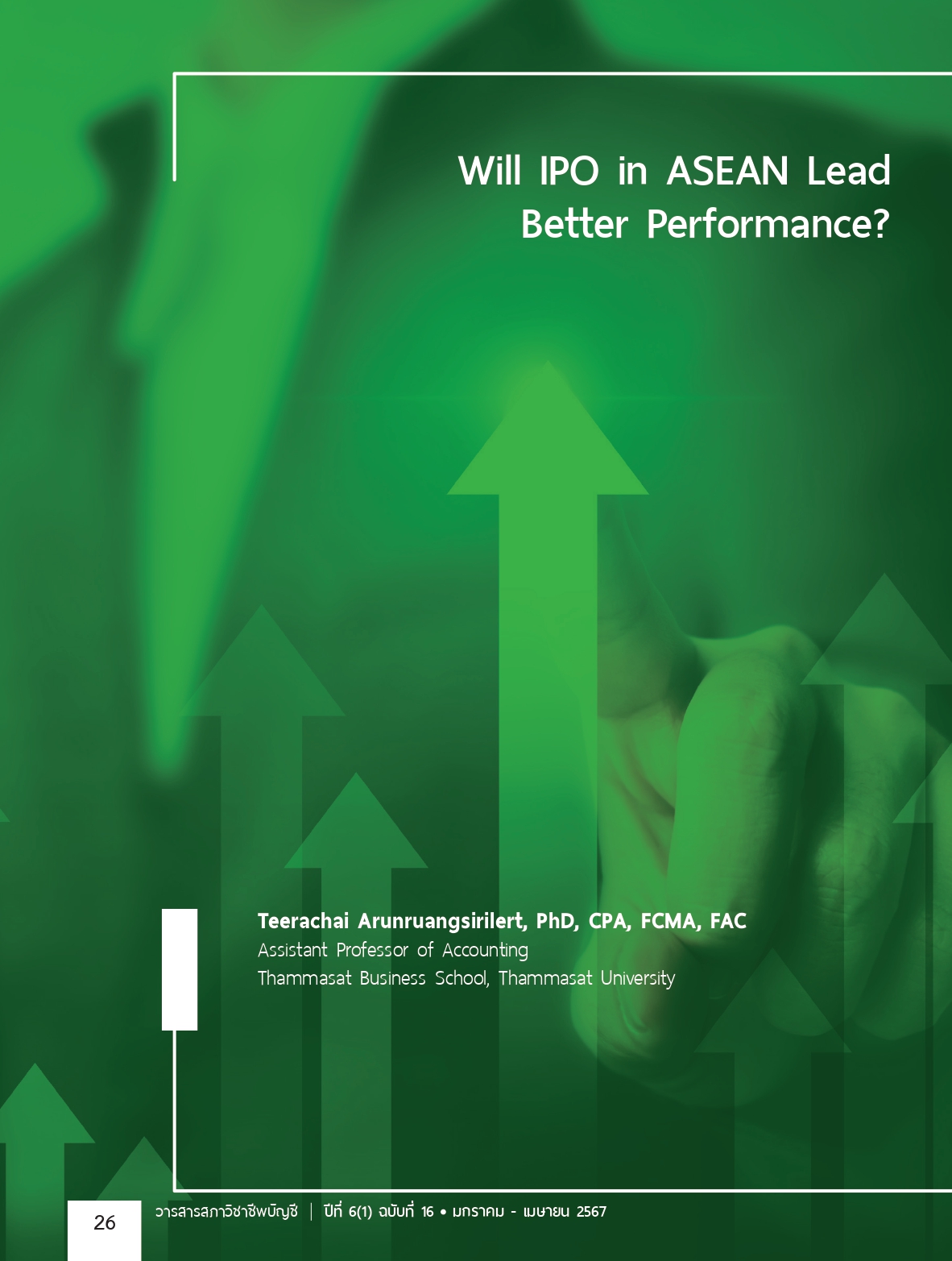Will IPO in Asean Lead Better Performance?
Main Article Content
บทคัดย่อ
This research aims to prove whether or not Initial Public Offering (IPO) within ASEAN capital market brings about better accounting performance. The study focuses on accounting performance by using multiple regression analysis to analyze data from 2,677 listed companies in six ASEAN countries which are Thailand, Indonesia, Malaysia, Philippines, Singapore, and Vietnam for 26 years from 1994 to 2019 which have totally 31,790 firm-year observations. Results empirically shows that IPO has a negative relationship with accounting performance because the owners of IPO firm need to sacrifice cost for agency control in order to maintain their maximum benefit. This study can bridge and add more literature of the IPO study. The research explores all significant countries in ASEAN in the effect of Initial Public Offering (IPO) on accounting performance covering all available data up to the year before COVID-19 pandemic. This study explores more opportunity in future research to deeply discover and study in each interesting issue of the empirical evidence. This study provides empirical evidence for consideration to whom aims to pursue IPO. The management and investors can observe the results of this study to support their decision making. In addition, regulators can improve policies to prevent earnings manipulation and fraudulence.
Article Details
เนื้อหาและข้อมูลในบทความที่ลงตีพิมพ์ในวารสารสภาวิชาชีพบัญชี ถือเป็นข้อคิดเห็นและความรับผิดชอบของผู้เขียนบทความโดยตรงซึ่งกองบรรณาธิการวารสารไม่จำเป็นต้องเห็นด้วยหรือร่วมรับผิดชอบใด ๆ
บทความ ข้อมูล เนื้อหา รูปภาพ ฯลฯ ที่ได้รับการตีพิมพ์ในวารสารสภาวิชาชีพบัญชี ถือเป็นลิขสิทธิ์ของวารสารสภาวิชาชีพบัญชี หากบุคคลหรือหน่วยงานใดต้องการนำข้อมูลทั้งหมดหรือบางส่วนไปเผยแพร่ต่อหรือเพื่อกระทำการใดๆ จะต้องได้รับอนุญาตเป็นลายลักษณ์อักษรจากวารสารสภาวิชาชีพบัญชี ก่อนเท่านั้น
เอกสารอ้างอิง
Ahmad-Zaluki, N. A., Campbell, K., & Goodacre, A. (2011). Earnings management in Malaysian IPOs: The East Asian crisis, ownership control, and post-IPO performance. International Journal of Accounting, 46(2), 111-137. doi: 10.1016/j.intacc.2011.04.001.
Alanazi, A.S., Liu, B., and Forster, J. (2011). The financial performance of Saudi Arabian IPOs. International Journal of Islamic and Middle Eastern Finance and Management, 4(2), pp. 146-157.
Auret, C., & Britten, J. (2008). Post-issue operating performance of firms listing on the JSE. Investment Analysts Journal 68(1), 21-30.
Barden, R.S., Copeland, J.E. Jr, Hermanson, R.H. and Wat, L. (1984). Going public--what it involves: A framework for providing advice to management. Journal of Accountancy (pre-1986), 157(000003), pp. 63.
Diamond, D.W., & Verrecchia, R.E. (1991). Disclosure, Liquidity, and the Cost of Capital. Journal of Finance, American Finance Association, 46(4), 1325-1359.
Goergen, M., Khurshed, A., and Mudambi, R. (2007). The long-run performance of UK IPOs: can it be predicted?. Managerial Finance, 33(6), pp. 401-419.
Hair, J.F., Black, W.C., Babin, B.J. and Anderson, R.E. (2010). Multivariate Data Analysis: A Global Perspective. 7th Edition, Pearson, New York.
Healy, P. M., & Wahlen, J. M. (1999). A Review of the Earnings Management Literature and Its Implications for Standard Setting. Accounting Horizons, 13(4), 365-383. doi: 10.2308/acch.1999.13.4.365.
Ibbotson, R.G. (1975). Price performance of common stock new issues. Journal of Financial Economics, Vol. 2, pp. 235-72.
Jain, B.A., & Kini, O. (1994). The Post-Issue Operating Performance of Ipo Firms. Journal of Finance, Vol. 49, No. 5, 1699-1726.
Jensen, M.C., & Meckling, W.H. (1976). Theory of the Firm: Managerial Behaviour, Agency Costs and Ownership Structure. Journal of Financial Economics, 3 (4), 305-360.
Leuz, C., & Verrecchia, R.E. (2000). The economic consequences of increased disclosure. Journal of Accounting Research, Wiley Blackwell, vol. 38, 91-124.
Ong, C. Z., Mohd-Rashid, R., Mehmood, W., & Tajuddin, A. H. (2021). Does disclosure of earnings forecasts regulation affect the valuation of IPOs? Evidence from an emerging country. Asian Review of Accounting, 29(4), 558-578. doi: 10.1108/ARA-09-2020-0142
Pagano, M., Panetta, F., and Zingales, L. (1998). Why Do Companies Go Public? An Empirical Analysis. The Journal of Finance, 53.1 (1998): 27-64.
Pastusiak, R., Bolek, M., Malaczewski, M., & Kacprzyk, M. (2016). Company Profitability Before and After IPO. Is it a Windows Dressing or Equity Dilution Effect?. Prague Economic Papers, University of Economics, Prague, 1, 112-124.
Pagano, M., Panetta, F., and Zingales, L. (1998). Why Do Companies Go Public? An Empirical Analysis. The Journal of Finance, 53.1 (1998): 27-64.
Schipper, K. (1989). COMMENTARY on Earnings Management. Accounting Horizons, 3(4), 91-102.
Shette, R., Kuntluru, S., & Korivi, S.R. (2016). Opportunistic earnings management during initial public offerings: evidence from India. Review of Accounting and Finance, Emerald Group Publishing, 15(3), 352-371.
Sosnowski, T. (2021). The credibility of earnings announced by new stock companies: accrual and real earnings management. Equilibrium (1689-765X), 16(3), 661-677. doi: 10.24136/eq.2021.024.
Vaus, D.D. (2002). Surveys in Social Research. Allen & Unwin.


